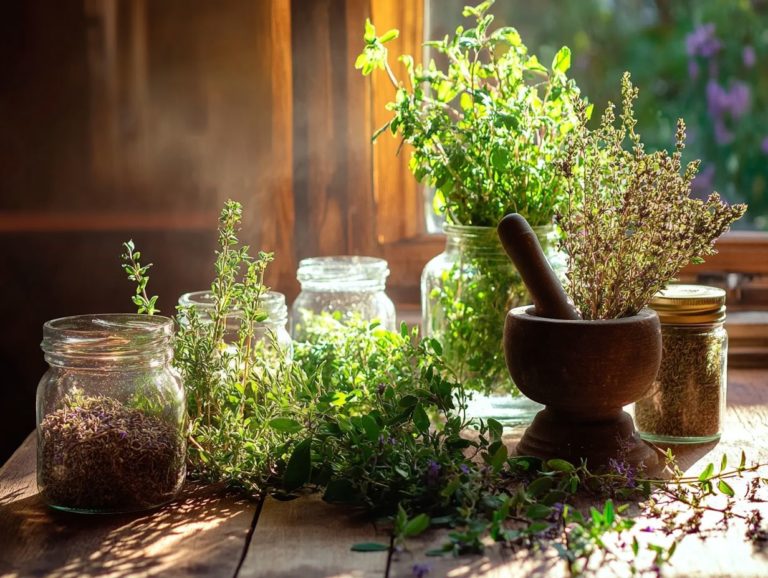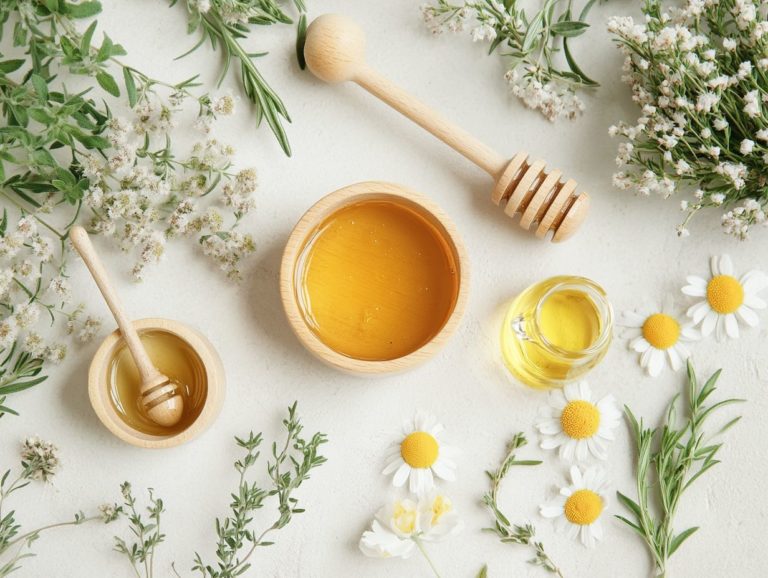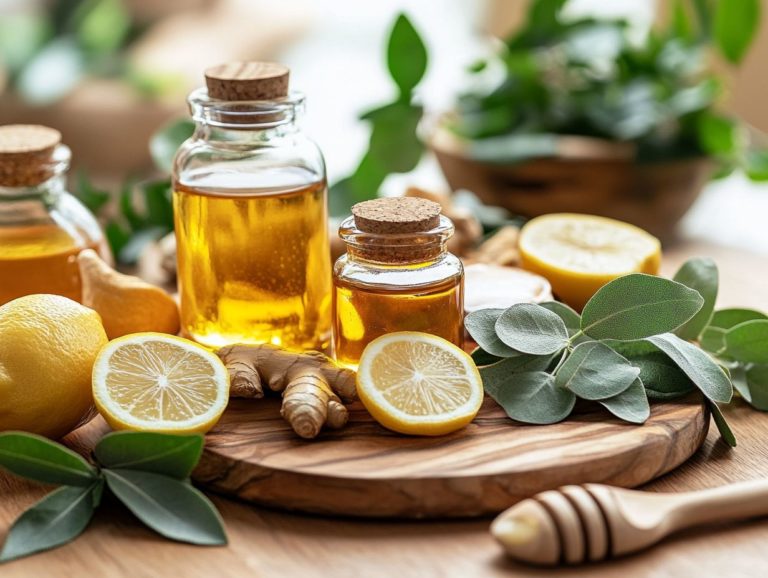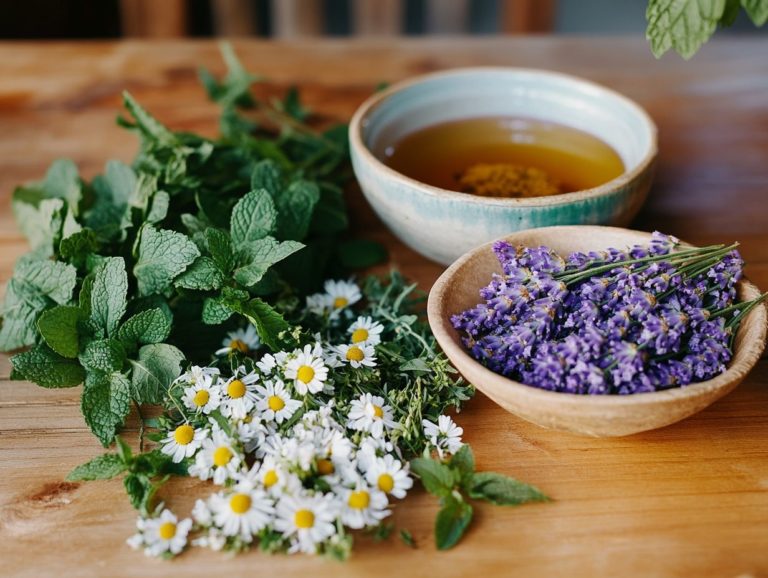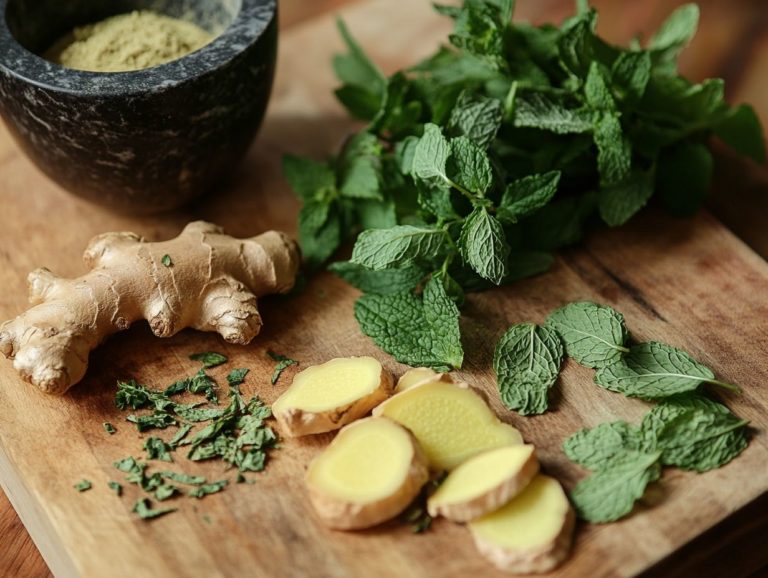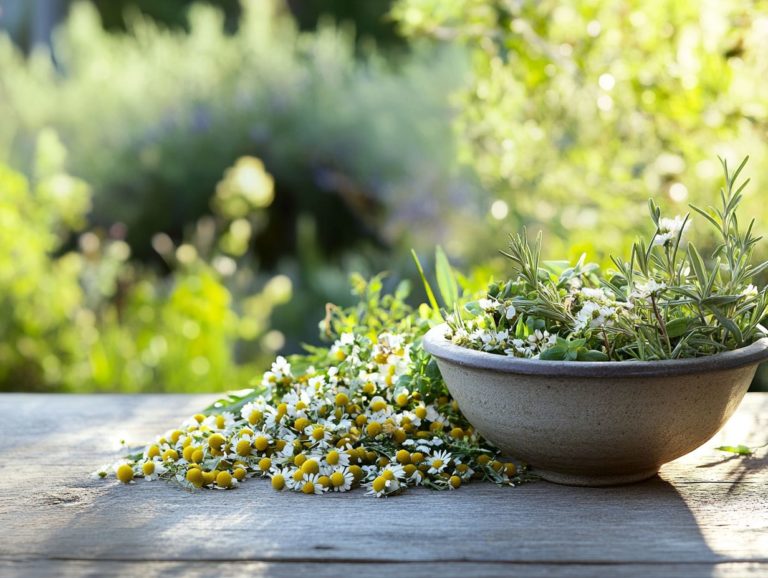Using Herbs to Promote Healthy Aging
As you age, maintaining your health and vitality becomes increasingly crucial. Incorporating herbs into your daily routine can support your health.
Herbs and spices can elevate your meals while offering specific health benefits, making them a significant ally in the quest for healthy aging. This article explores herbs that boost well-being, provides tips for seamlessly integrating them into your diet, and discusses potential dietary supplements along with their effects.
Key considerations are highlighted to ensure your herbal journey is both safe and effective. Find out how these powerful plants can help you age gracefully and healthily!
Contents
- Key Takeaways:
- The Role of Herbs in Healthy Aging
- Top Herbs for Healthy Aging
- How to Incorporate Herbs into Your Diet
- Herbal Supplements for Aging
- Potential Risks and Side Effects
- Frequently Asked Questions
- Can herbs really promote healthy aging?
- What are some popular herbs used for healthy aging?
- How can I incorporate herbs into my daily routine?
- Are there any side effects of using herbs for healthy aging?
- Do herbs only work on the outside for aging, or do they help the inside too?
- Can herbs be used in conjunction with other anti-aging methods?
Key Takeaways:
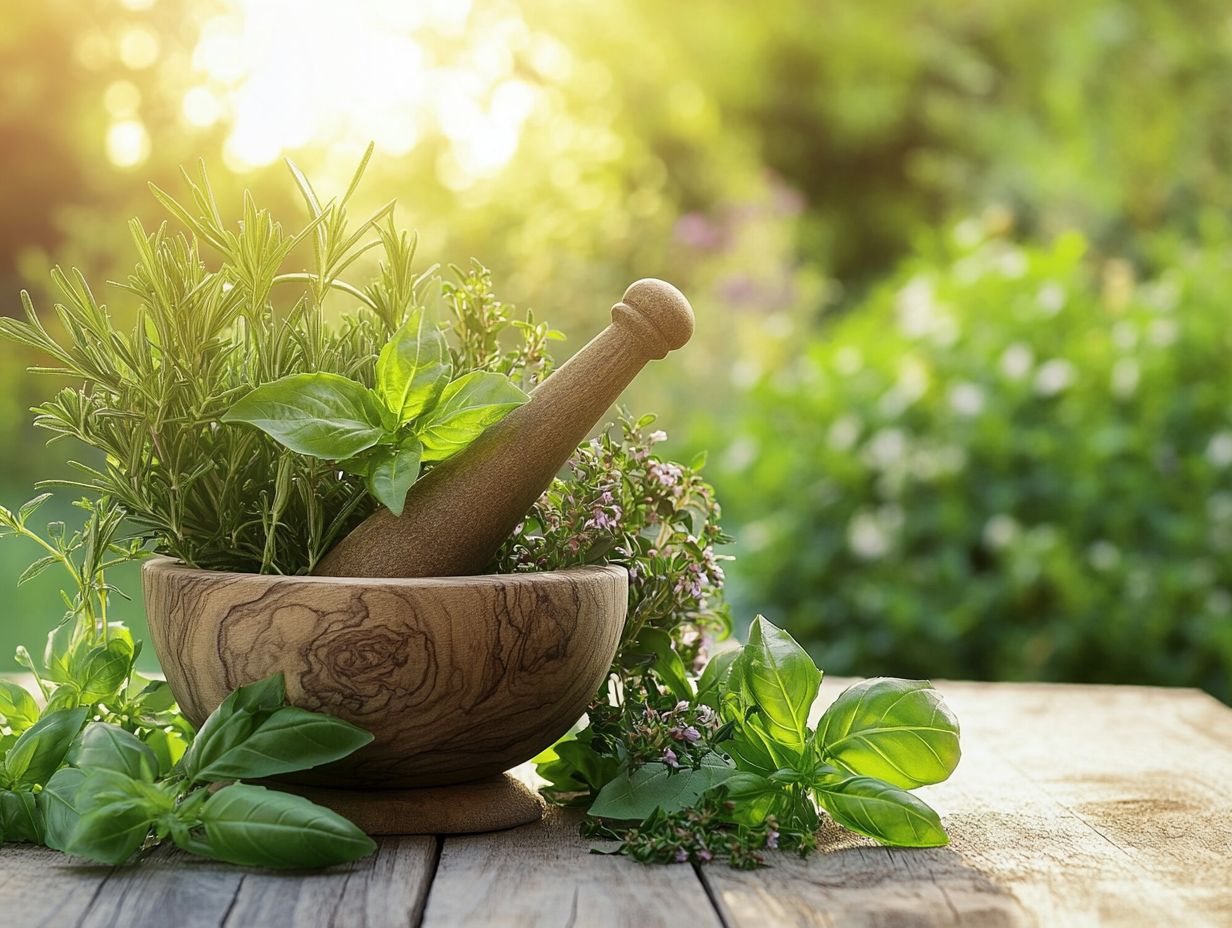
- Herbs can play a significant role in promoting healthy aging by providing a natural and holistic way to support overall well-being.
- Some top herbs for healthy aging include turmeric for reducing inflammation and ginkgo biloba for cognitive support.
- Incorporating herbs into your diet can be easy and delicious through recipes and simple tips like adding fresh herbs to meals or drinking herbal teas.
The Role of Herbs in Healthy Aging
The role of herbs in promoting healthy aging is truly remarkable. These natural ingredients have long been embraced in both traditional medicine and contemporary wellness practices to elevate health benefits and support longevity.
You’ll find that herbs like turmeric, cinnamon, and garlic are celebrated for their powerful anti-inflammatory properties, which play a crucial role in fighting age-related diseases like diabetes and cardiovascular issues. Additionally, using herbs for hormonal imbalance can also contribute to overall health and well-being.
Expert dietitian Monica Auslander Moreno from the University of Miami highlights the importance of adding these herbal remedies to your diet, pointing out their antioxidant and nutrient-rich profiles that enhance a well-rounded wellness routine. She emphasizes how these ingredients are essential for maximizing nutrient absorption.
Benefits and Uses of Herbs for Aging
Herbs and spices offer a wealth of benefits that are particularly vital for those navigating the aging process. They provide natural health advantages that effectively address inflammation, cognitive function, and immune support, crucial for maintaining a healthy lifestyle.
Incorporating specific herbs and spices into your daily routines can lead to remarkable improvements in your overall well-being. For instance, turmeric can significantly alleviate chronic pain conditions such as arthritis. Meanwhile, green tea isn t just a refreshing drink; it also harbors weight loss potential, as its antioxidants enhance metabolism and promote fat oxidation, making it a perfect addition to a healthful diet.
Ginkgo biloba deserves a spotlight for its cognitive enhancement abilities, helping to sharpen your mental clarity and memory. These herbs act as powerful dietary supplements, and among them, 5 herbs for enhancing longevity may help reduce the risk of developing severe chronic conditions, elevating your quality of life as you age by addressing issues like inflammation and providing immune support.
Top Herbs for Healthy Aging
Regarding healthy aging, several remarkable herbs truly stand out. Turmeric, cinnamon, garlic, and ginger are among the most effective, each brimming with antioxidants and phytochemicals (natural compounds found in plants) that enhance wellness and vitality.
Embracing these powerful herbs can significantly contribute to your overall health as you age gracefully.
Start incorporating these herbs today for a healthier tomorrow!
Specific Herbs and Their Benefits
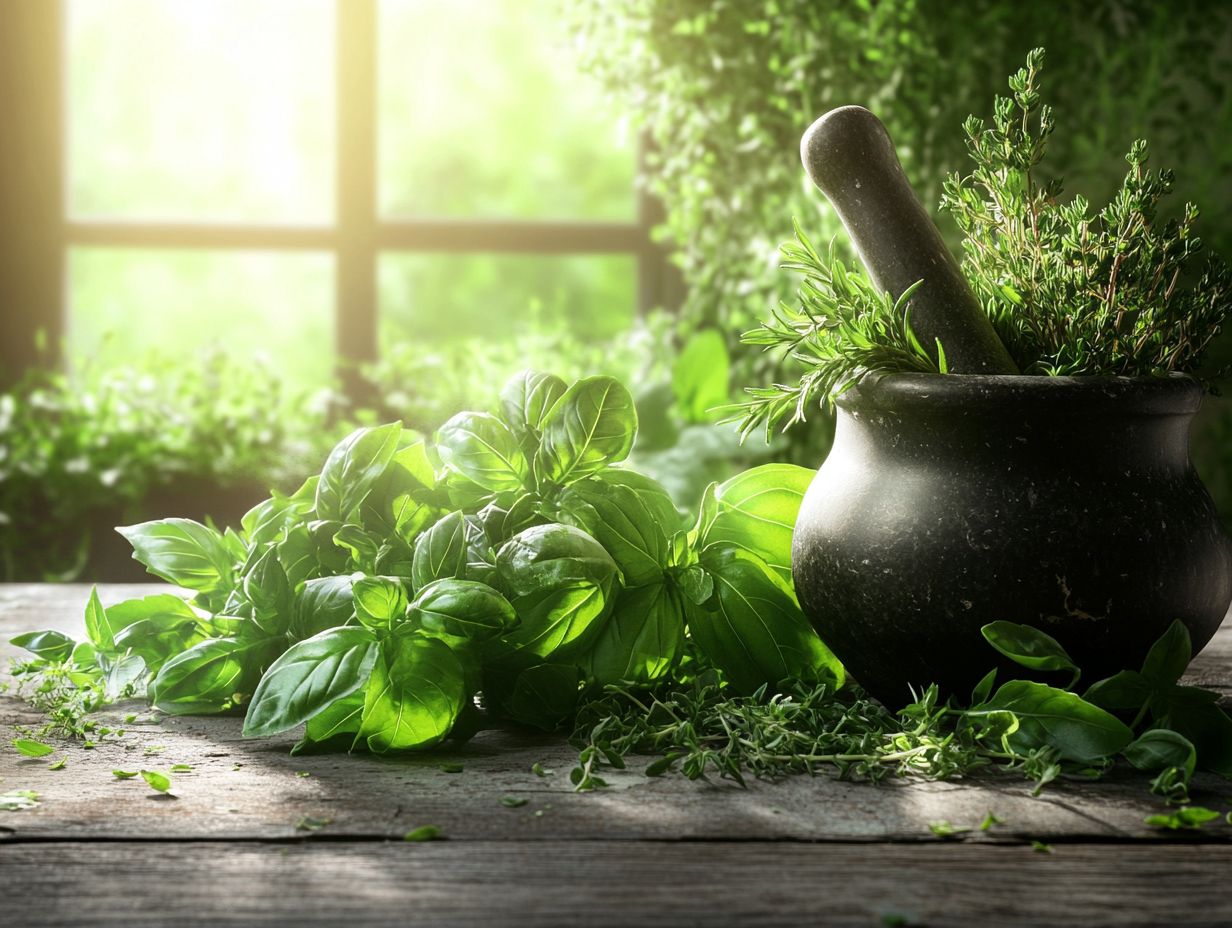
Herbs like turmeric, cinnamon, garlic, ginger, and rosemary offer unique health benefits. They help maintain your well-being as you age.
These treasures have been valued for centuries. They are celebrated for both their cooking flexibility and health benefits due to their rich natural compounds and antioxidants.
For example, turmeric is famous for its strong anti-inflammatory effects. Curcumin, its active compound, may support brain function and relieve pain by protecting brain cells.
Cinnamon is praised for helping regulate blood sugar levels. This is essential for your overall health, especially if you manage diabetes.
Garlic, rich in antioxidants, supports your immune system and promotes heart health. Ginger is recognized for its digestive benefits and may help reduce inflammation.
Rosemary enhances meals and may support your memory. Try adding it to your dishes for a delightful boost.
How to Incorporate Herbs into Your Diet
Adding herbs to your meals can be a fun and tasty adventure. You can explore recipes, cooking tips, or enjoy herbal teas to elevate your meals and support a healthy lifestyle.
Embrace the versatility of herbs. Watch how they transform your cooking while nurturing your well-being.
Recipes and Tips for Adding Herbs to Meals
Using herbs and spices can elevate your cooking. They provide not just amazing flavors but also significant health benefits.
For instance, adding basil to a classic Caprese salad enhances the aroma and boosts its antioxidant profile.
A sprinkle of parsley in soups can improve digestion and brighten the flavor of your dish.
Thyme is perfect for roasting vegetables. Its earthy taste pairs wonderfully with root veggies.
Infusing oils with garlic and rosemary creates a delicious base for dressings or marinades.
Understanding the uses of herbs like dill or cilantro can turn everyday meals into exciting, nutritious experiences.
Herbal Supplements for Aging
Herbal supplements are a popular choice for improving health as we age. They offer concentrated benefits for chronic conditions while promoting overall wellness.
Types of Supplements and Their Effects
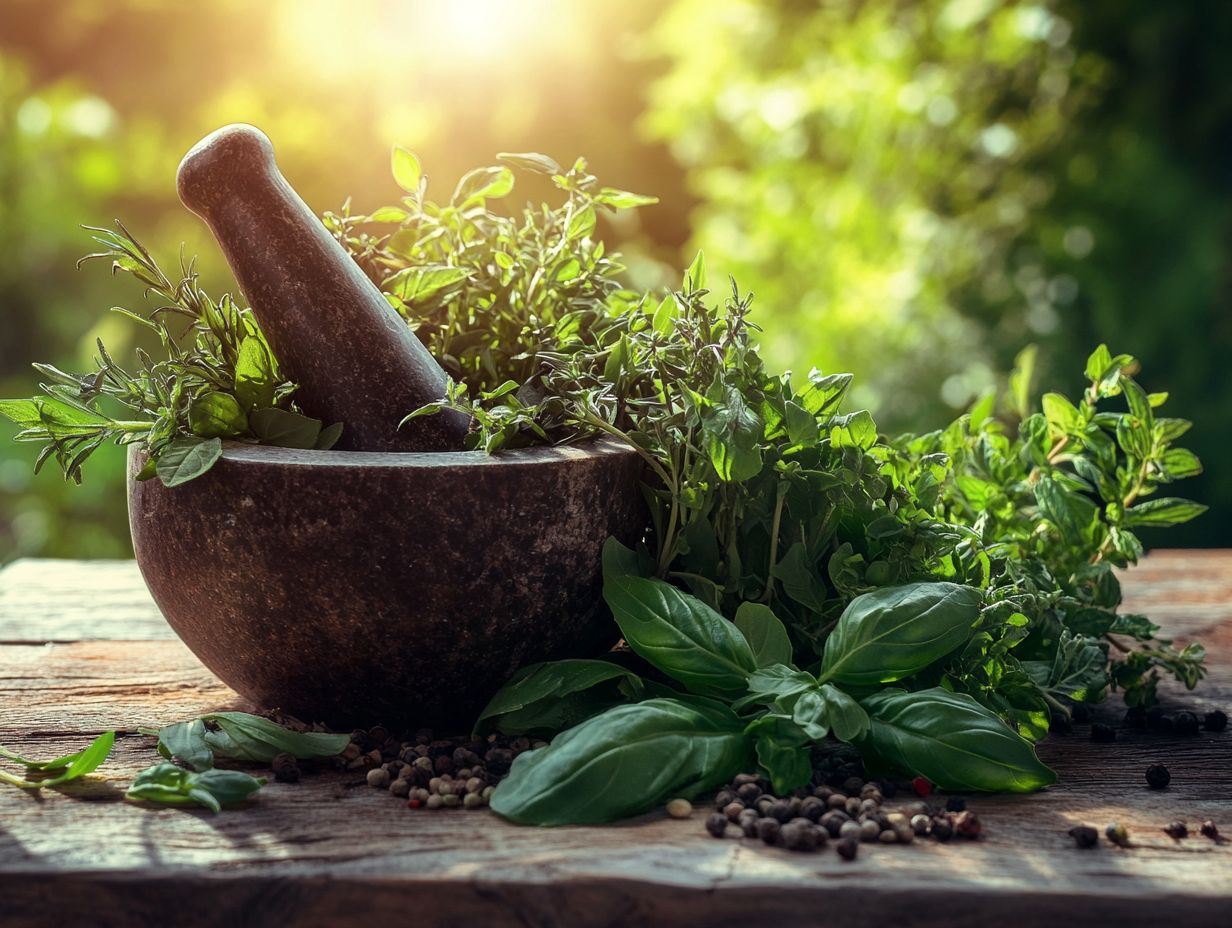
A variety of herbal supplements are available, each with unique effects aimed at combating aging and enhancing vitality.
Herbs like turmeric and ginger are well-known for their anti-inflammatory properties. They are popular among those looking to relieve joint pain and reduce swelling.
On the other hand, ashwagandha and ginseng are sought after for their energy-boosting and mental clarity benefits.
Also, elderberry and echinacea are valued for their immune-boosting benefits, particularly during cold and flu season.
Understand these categories to make informed choices about which herbal supplements align with your health goals.
Potential Risks and Side Effects
Herbal supplements offer many health benefits. However, be aware of potential risks, especially if you are older or managing chronic conditions.
Important Considerations for Using Herbal Supplements
Understand how herbal supplements interact with medications. Always consult healthcare professionals, especially if you are older or have metabolic disorders.
These factors are critical, as many supplements can interfere with the effectiveness of other medications, potentially leading to undesirable side effects or diminished efficacy. Not everyone will experience the same benefits from herbal remedies; however, using herbs to boost metabolism can be beneficial. Your unique health conditions, genetics, and lifestyle choices can significantly influence the outcomes.
The quality of herbal products can differ widely, so choose reputable brands and look for third-party testing. Engage in open dialogue with your healthcare provider for personalized guidance, enhancing your safety and overall well-being as you incorporate these natural alternatives, including essential oils, into your routine.
Frequently Asked Questions
Can herbs really promote healthy aging?
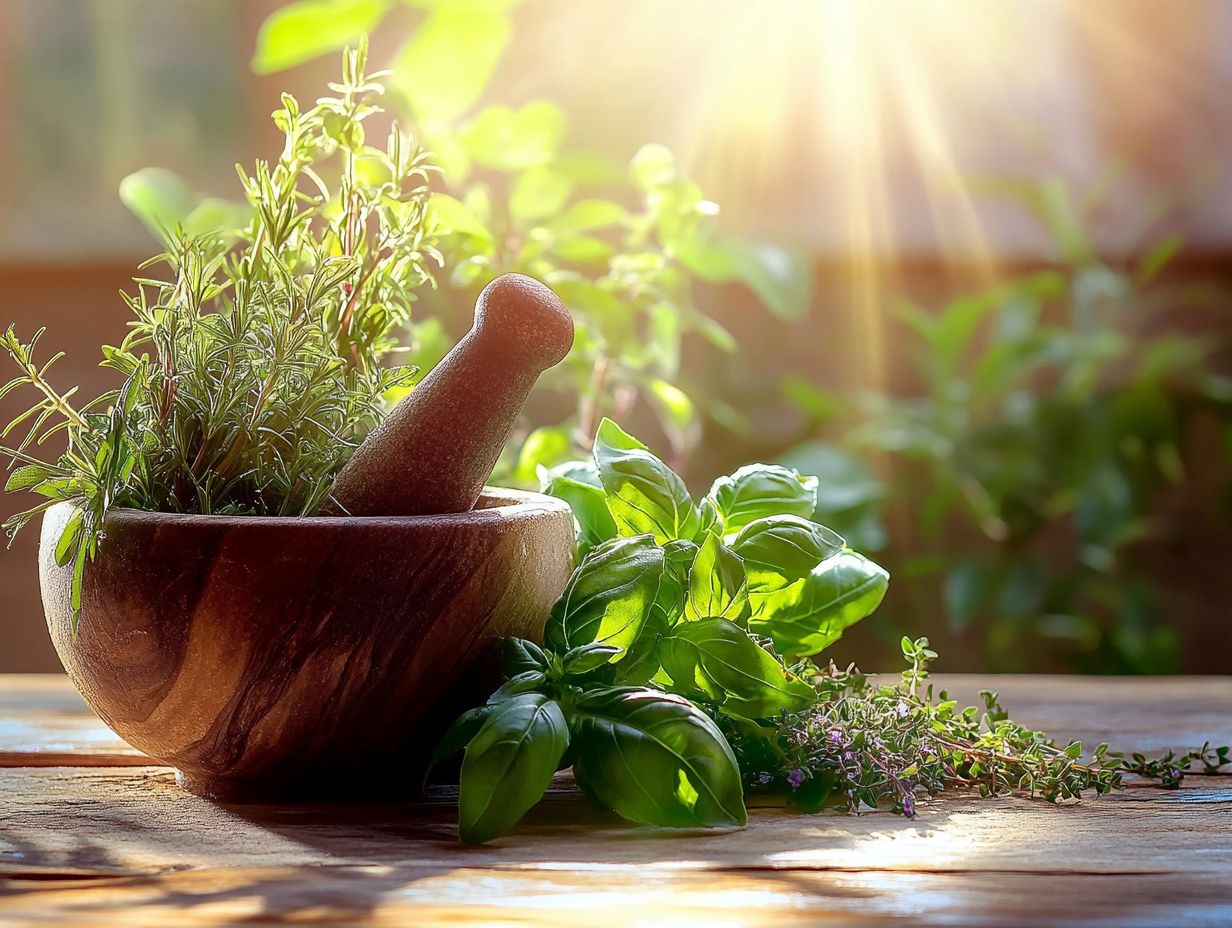
Yes! Certain herbs can promote healthy aging! They contain powerful antioxidants and anti-inflammatory compounds that can help slow down the aging process and support overall health and well-being.
What are some popular herbs used for healthy aging?
Some of the most commonly used herbs and spices for promoting healthy aging include turmeric, ginger, ashwagandha, ginseng, and green tea, all celebrated for their antioxidant properties.
How can I incorporate herbs into my daily routine?
You can add herbs to your diet by drinking herbal teas, using them in cooking, or taking them in supplement form. You can also use herbal oils and creams topically for rejuvenating effects.
Are there any side effects of using herbs for healthy aging?
While herbs are generally safe and well-tolerated, it’s important to consult with a healthcare professional before incorporating them into your routine. Some herbs may interact with certain medications or have adverse effects for specific individuals.
Do herbs only work on the outside for aging, or do they help the inside too?
Herbs can have both external and internal benefits for healthy aging. Some herbs, like aloe vera and lavender, can be used topically for skin health, while others, like turmeric and ginger, can be consumed for their anti-aging properties.
Can herbs be used in conjunction with other anti-aging methods?
Absolutely! Using herbs along with a healthy diet, regular exercise, and stress reduction techniques can have a synergistic effect on promoting healthy aging. Just be sure to discuss with your healthcare provider before beginning any new supplement or health regimen.

